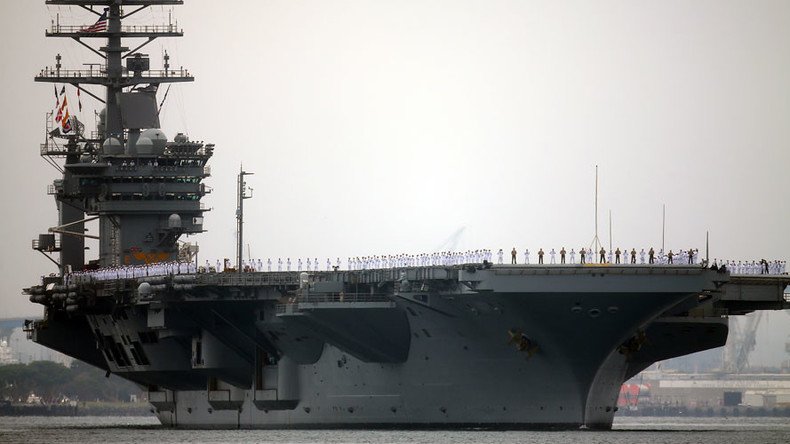US, India, Japan stage largest joint drills to address ‘maritime security threats’

The US has begun naval exercises with Japan and India, with the US Navy saying the drills will help the countries tackle maritime threats in the Asia-Pacific region. China says it hopes the cooperation isn’t aimed against a “third country.”
The US Navy, the Indian Navy, and the Japan Maritime Self-Defense Force (JMSDF) began the Malabar 2017 exercises in Chennai, India, on Sunday, according to the US Pacific Fleet.
The annual drills are aimed at addressing “the variety of shared threats to maritime security in the Indo-Asia Pacific,” the Navy said last week.
#USSNimitz Carrier Strike Group begins #Malabar2017 exercise with @IndianNavy, #JMSDF - https://t.co/hAQ9cnNmJspic.twitter.com/SIHCSCRars
— U.S. Pacific Fleet (@USPacificFleet) July 9, 2017
The exercises are also aimed at “improving interoperability between US, Indian, and Japanese maritime forces,” according to the US Pacific Fleet.
The trilateral, two-phase drills are held in Chennai and the Bay of Bengal.
“The exercise emphasizes high-end warfighting skills, maritime superiority and power projection,” the US Pacific Fleet wrote on Sunday.
#Malabar2017 US Navy Boeing P8 I (Long Range MR & ASW ac) lands at INS Rajali Arakonam TN for the exercise @USPacificFleet@SpokespersonMoDpic.twitter.com/dXwqTEinTt
— SpokespersonNavy (@indiannavy) July 9, 2017
It added that crews will "practice surface and antisubmarine warfare maneuvers, perform medical exchanges, hold explosive ordnance disposal training, and conduct, visit, board, search and seizure operations.”
Participants from the US Navy include the Nimitz-class aircraft carrier ‘USS Nimitz’ with embarked Carrier Air Wing 11; the guided-missile cruiser ‘USS Princeton’; guided-missile destroyers ‘USS Howard’, ‘USS Shoup’, and ‘USS Kidd’; a P-8A Poseidon aircraft; and a Los Angeles-class fast-attack submarine.
READ MORE: Navies of US & Philippines conduct joint patrol (VIDEO)
India's lone carrier ‘Vikramaditya’ will also participate, along with submarines and maritime reconnaissance platforms. Two Shivalik-class stealth frigates, two Russian-tuilt Ranvir-class destroyers, the indigenous Kamorta-class anti-submarine warfare corvette and a Kora-class multi-role corvette will be deployed, according to the Indian Express.
@USAndIndia welcomes USS Princeton to Chennai for #Malabar2017 tri-lateral exercises! @USNavy@indiannavy@JMSDF_PAOpic.twitter.com/lVFa08sh0Z
— U.S. Embassy India (@USAndIndia) July 9, 2017
“Naval co-operation between India, US and Japan epitomizes the strong and resilient relationship between the three democracies,” India's Defense Ministry said in a statement, as quoted by Reuters.
Japan's biggest warship, the helicopter carrier ‘Izumo’, is also taking part in the drills, according to Reuters. In addition, the Japan Maritime Self Defense ship ‘JS Sazanami’ will reportedly be participating.
The drills are the largest since the US and India launched them in 1992. Japan began participating in 2007 and became a permanent partner in 2015.
READ MORE: ‘Be more lethal’: Major Australia & US joint military exercise kicks off in Pacific
It comes amid regional tensions with China, with all three countries expressing concern about Beijing's claim to almost all of the waters in the South China Sea, and its expanding military presence.
The Indian Navy has reportedly spotted more than a dozen Chinese military vessels in the Indian Ocean over the past two months, Reuters reported, citing local media.
India turned down a request for Australia to participate in this year's drills, fearing it would further antagonize China, Reuters reported. Australia has participated in the past as a non-permanent member.
Chinese Foreign Ministry spokesman Geng Shuang responded to the annual drills on Friday by saying Beijing has “no objection” to normal cooperation, but that it hopes such cooperation “will not be directed against [a] third country and that it will be conducive to the regional peace and security.”












